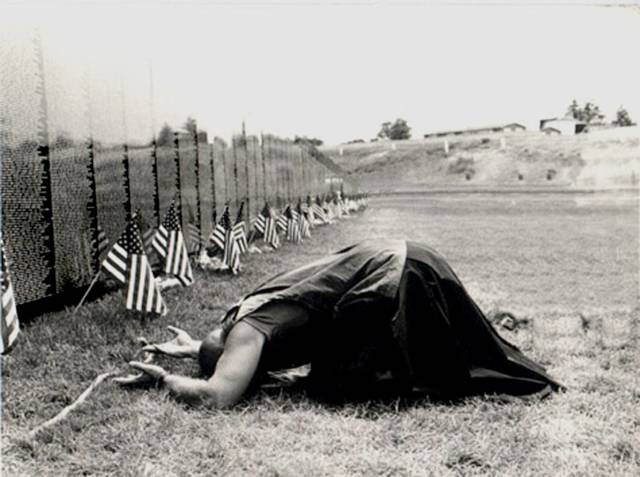PubliCalender: Ghost Signs, a Picnic in the Park, and Worker Solidarity
Today's picks for civic nerds.
For Friday

Learning from Loss
Join filmmaker Nancee Sobonya and Wallingford Neigbhors for Peace and Justice at their Meaningful Movies screening of The Gifts of Grief. Sobonya's 2005 film explores stories of grief and how others have learned from loss. A Q&A and a community discussion with Sobonya will follow the screening.
Meaningful Movies: The Gifts of Grief, Fri, July 12, 7-9:30pm, Keystone Congregational United Church of Christ, 5019 Keystone Place N., free.
For Thursday
Minimum-Wage Workers Unite
In response to the May 30 fast-food workers' strike, in which employees of fast-food chains across the city walked out to protest poverty-level wages (and demand a "living wage" of $15 an hour), the city council is hosting a brown bag to learn more about poverty-level jobs, wage theft, health and safety concerns, and workers' fear of retaliation for union organizing.
Fast-food Workers' Brown Bag Discussion, Thurs, July 11, 12pm–1:30pm, Council Chambers, City Hall, 600 Fourth Ave., free
Ghost Sign Tour
Ghost signs—those rapidly disappearing, hand-painted advertisements on the signs of buildings that are rapidly being lost to development and time—are all over Seattle if you know where to look. Join this walking tour—one of the only tours of the pre-WWII built environment in Seattle—and learn about these fading relics.
Ghost Signs Tour, Thurs, July 11, 10am, 100 Yesler Way (the Pergola), $40.Picnic in the Park
Spend the next beautiful summer evening at the first annual Volunteer Park Trust Summer Picnic. Volunteer Park Trust is a new nonprofit that came together to preserve Capitol Hill's Volunteer Park.
Bring a blanket and pitch a spot on the great lawn in front of the Volunteer Park bandstand where you can listen to live bluegrass by the Shed Boys and enjoy Dante's Inferno Dogs, plus free ice cream and lemonade courtesy of the Trust.
Summer Picnic in Volunteer Park, Thurs, July 11, 6-8 pm, Volunteer Park, 1247 15th Ave. E, free.
Local Beats
This week's free concert at City Hall Plaza features Big World Breaks, featuring the local drumming powerhouse Aaron Walker-Loud.
The group began playing backup music for Seattle's breakdancing scene in the early 2000s, combining funk, soul, jazz and world music influences. Many members of Big World Breaks are alumni of the nationally acclaimed Seattle jazz programs at Garfield and Roosevelt High Schools.
Check out the summer-long list of free concerts presented by the city's Office of Arts & Culture.
Seattle Presents: Big World Breaks, Thurs, July 11, 12-1:30pm, City Hall Plaza, 600 4th Ave, free.
For Wednesday
A Revolutionary Summer
Follow the events leading up to the United States' independence with Pulitzer Prize winner and historian Joseph J. Ellis, whose latest book, Revolutionary Summer: The Birth of American Independence, describes the dramatic months leading up to the 13 U.S. colonies' secession from the British empire. Ellis has written 11 books on the Founding Fathers and the American Revolution.
He currently teaches at University of Massachusetts at Amherst.
Josh says Ellis' 2007 book the American Creation is one of his all-time favorites. He appears to be serious; he pointed us to a blog post he wrote about the book on his personal blog in late 2008, when he made a list of his favorite reads of the year.
I finished reading American Creation this afternoon, and I must report that in his conclusion, Ellis circles right back to both Federalist No. 10 and Federalist No. 44, describing the United States as an equation in time and space. Federalist No. 10 was Madison's counterintuitive thesis that space (size really) was better for good government because it diffuses factions and dictates compromise.
The expanding liberal mandate at the start that left room, up ahead, for an Abraham Lincoln and a Martin Luther King to join the list of founders.
In closing though, Ellis then introduces the notion of time by zooming in on Madison's idea in Federalist No. 44 that the Republic must "accommodate all the possible changes which futurity may produce." Ellis does this all with a nod to the "necessary and proper" clause which empowered the Civil Rights movement some 180 years after Madison wrote No. 44.
And Ellis ends the book like this:
"But the design of the political foundation was ingenious in its combination of stability and agility, most especially its prudent placement of the expanding liberal mandate at the start that left room, up ahead, for an Abraham Lincoln and a Martin Luther King to join the list of founders. In that sense, perhaps the most creative act of the founding era was to make time as well as space an indispensable ally, in effect extending the founding moment everlastingly into the future."
Joseph J. Ellis: The Revolutionary Summer of 1776, Wed, July 10, 7:30-9pm, Town Hall, 1119 8th Ave, $5.
Want to see your nerdy event featured on the PubliCalendar?
Send the details to Carryn at [email protected]
